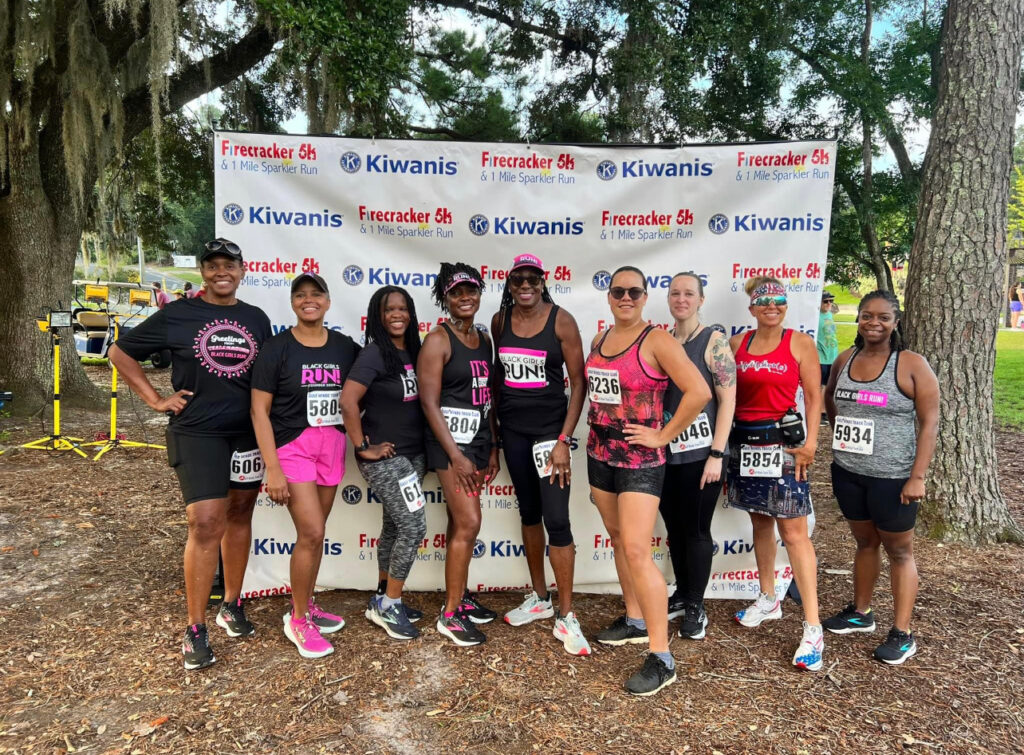
Photo 1 Courtesy: Berinice Mercer Lewis
Despite the dominance of African runners in long-distance races such as the 5,000-meter, 10,000-meter, half-marathons, and marathons, African Americans who enjoy long-distance running are few and far between. According to a 2020 survey conducted by Running USA, only three percent of long-distance runners in the United States were Black.
Representation is important. From a young age, many African American kids see themselves on television running the 100-meter or the 200-meter. Many have never seen themselves run anything longer than a 400-meter race. Initially, many African American kids are put into those short-distance events, and through shorter-distance events, they find that they are better suited for speed races.
For Madison Gordon, a senior on the FAMU cross country team, her journey to cross country was a lot like other kids. Mainly a cheerleader, she began competing in cross country in middle school. There, she was discovered by a club distance coach, and the rest is history. She says she is grateful for the opportunities she has had as a long-distance runner.
“It [cross country] has afforded me the gift of paying for schooling as blessed with numerous friends I now consider family,” she said.
In addition to the opportunities Gordon has received, she says that running and cross country have helped her increase her mental toughness.
“There were times I haven’t been running my best and would become very discouraged,” Gordon said. “But I am grateful for those moments mentally; those moments have prepared me to know how to handle and deal with the obstacles life throws at you.”
She says that while running has been a way to stress release from the business of college life, it has also taught her discipline in all aspects of life. Gratefulness and motivation have been a primary driving force during tough times, and she believes hard work has paid off.
As a biology pre-med student, Gordon wholeheartedly recognizes the health challenges that African Americans disproportionately have to face. She believes running can significantly benefit African Americans, improving their cardiovascular health and decreasing their risk of hypertension, diabetes, and obesity.
“Running can be a preventative measure and helping to promote better health,” she said. “Not only does running come with a boatload of health benefits, speaking from personal experiences, it comes with a community and an outlet to just be free.”
Multiple sources back up Gordon’s points. Penn Medicine states Black people are 40 percent more likely to have high blood pressure than white people. Their study also found that Black people were 1.3 times more likely than white people to be obese and 60 percent more likely to be diagnosed with diabetes.
Running organizations centered on African Americans, like Black Men Run and Black Girls Run, were rooted in helping to fight these discrepancies.
Black Girls Run was founded in 2009 by Toni Carey and Ashley Hicks to motivate Black women to live healthier lifestyles. Fourteen years later, the message and thousands of members in over 70 cities still stand.
Berinice Mercer-Lewis and Zandra Odum are the two ambassadors for the Black Girls Run chapter in Tallahassee.
Lewis began running more than two decades ago while participating in Team in Training for the Leukemia Foundation for Charity. She has since completed 30 marathons and 50 half-marathons.
For Lewis, running is more than exercise; it’s enjoyable. “I love running,” she said. “It’s easy to stay motivated, It’s my therapy.”
Mercer-Lewis explained the effects running had on her physical health, which included aiding in weight maintenance and better sleep.
Regarding Black Girls Run, Lewis and her fellow ambassador Odum take great pride in representing the organization. Lewis says that her fellow Black Girls Run members have also improved their physical health by beginning a running routine. Lewis hopes to continue inspiring others in Tallahassee to take the first step toward living healthier through the Black Girls Run organization.
“I want to inspire the community to live healthier,” she said. “Through Black Girls Run Tallahassee, I think I am making it happen with the ladies that come out to run and walk.”
For those interested in joining Black Girls Run, visit their website at blackgirlsrun.com to find the Facebook groups for over 70 cities across the U.S. People can also follow the national organization on social media for updates on all upcoming events.